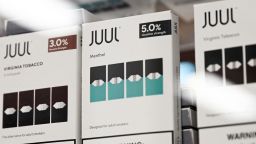The US Department of Justice took legal action against six e-cigarette manufacturers Tuesday, seeking permanent injunctions against the manufacturers on behalf of the US Food and Drug Administration. The flurry of complaints marked the first time the FDA has taken this step against e-cigarette manufacturers to enforce its premarket review requirements for new tobacco products.
The six manufacturers failed to submit the necessary premarket applications for their e-cigarette products “and have continued to illegally manufacture, sell, and distribute their products, despite previous warning from the FDA that they were in violation of the law,” the FDA said in a statement.
“Today’s enforcement actions represent a significant step for the FDA in preventing tobacco product manufacturers from violating the law,” said Brian King, director of the FDA’s Center for Tobacco Products. “We will not stand by as manufacturers repeatedly break the law, especially after being afforded multiple opportunities to comply.”
The Federal Food, Drug, and Cosmetic Act requires that companies submit applications to the FDA and get them approved before manufacturing, selling or distributing new tobacco products. Companies that had products on the market before this provision took effect still had to submit applications.
The FDA says it issued nearly 300 warning letters between January 2021 and September 9, 2022, for failure to submit applications, and most of those companies have removed their products from the market. This month, the agency sent a warning letter to the maker of Puff Bar products, which are especially popular among young people, for operating without a marketing authorization order. In June, the agency ordered e-cigarette giant Juul Labs to remove its products from the market, but a court blocked that ban, so those products are still available.
Advocates have criticized the FDA as too slow to act on a majority of the premarket applications. In May, the agency announced that it would not finish reviewing all the premarket applications from e-cigarette companies until June 2023, nearly two years past its court-ordered deadline to make a decision about those products.
Erika Sward, assistant vice president for national advocacy for the American Lung Association, said Tuesday’s actions send “a very important message to manufacturers that that they need to follow the law.”
“This is a monumental first step forward for FDA and DOJ, and we are really encouraged by this action,” she said. “I’m really pleased that this is the kind of step forward. This is what FDA needed to do from the beginning, and we’re very pleased to see this.”
Sward credited King, who was named director of the Center for Tobacco Products in July, with providing the impetus for the increased actions.
“We are very hopeful that this indicates that FDA and DOJ will take more of these steps against other recalcitrant manufacturers,” she said. “And we also very much hope the manufacturers get the message that under Dr. King’s leadership, this is a different Center for Tobacco Products.”
The complaints were brought against manufacturers that the FDA alleges continued to make and distribute nicotine products even after they were warned that they were in violation of the law. According to the court filings, the six manufacturers all received warning letters from the FDA informing them that they were manufacturing tobacco products that lacked the required approval.
Several of the defendants also participated in teleconferences with the FDA after receiving the warning letters, the government said. Some of the manufacturers allegedly told the agency that they would cease manufacturing and distributing the nicotine products in question, but follow-up inspections showed that the products were still being manufactured and sold, according to the complaints.
Get CNN Health's weekly newsletter
Sign up here to get The Results Are In with Dr. Sanjay Gupta every Tuesday from the CNN Health team.
“These cases are an important step in stopping the illegal sale of unauthorized electronic nicotine delivery system products,” Principal Deputy Assistant Attorney General Brian M. Boynton, who leads the DOJ’s Civil Division, said in a statement. “The Department of Justice will continue to work closely with FDA to stop the distribution of illegal, unauthorized tobacco products.”
The six companies named in Tuesday’s court filings are Morin Enterprises Inc., doing business as E-Cig Crib, in Minnesota; Soul Vapor LLC in West Virginia; Super Vape’z LLC in Washington; Vapor Craft LLC in Georgia; Lucky’s Convenience & Tobacco LLC, doing business as Lucky’s Vape & Smoke Shop, in Kansas; and Seditious Vapours LLC, doing business as Butt Out, in Arizona. The companies have not yet responded to CNN’s requests for comment.
“Mr. King seems delighted to kick in the doors of small businesses but turns a blind eye to the millions of Americans who rely on nicotine vaping to quit cigarettes,” Amanda Wheeler, president of the American Vapor Manufacturers Association, said in a statement. “The ongoing result is countless people being driven back to smoking.”
CNN’s Amanda Sealy contributed to this report.



